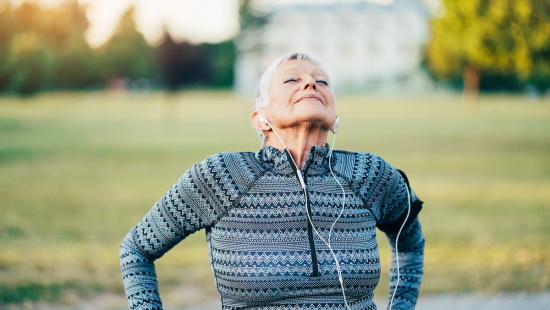COVID and COPD

Chronic obstructive pulmonary disease (COPD) is an underlying condition that puts you at greater risk of serious illness from COVID-19. Although it can affect your body in other ways, COVID-19 most commonly attacks your respiratory system, causing symptoms including cough, shortness of breath and trouble breathing.
COPD alone makes it hard to breathe. People who have it may have limitations like difficulty walking and climbing stairs or being unable to work. They are also more likely to:
- Have other chronic diseases (including congestive heart failure, diabetes, heart disease, stroke or asthma)
- Need special equipment like an oxygen tank
- Have more emergency room visits or overnight hospital stays
- Get vaccinated against COVID-19 and get a booster as soon as you're eligible.
- Continue to practice of other safety precautions established during the pandemic (masking, social distancing, frequent handwashing, etc.)
What is COPD?
COPD is a group of diseases, including emphysema and chronic bronchitis, that cause airflow blockage and breathing-related problems. Symptoms include:
- Frequent coughing or wheezing
- Excess phlegm, mucus or sputum production
- Shortness of breath
- Difficulty taking a deep breath
How COVID-19 Affects Your Respiratory System
According to the National Heart, Lung, and Blood Institute (NHLBI), SARS-CoV-2, the virus that causes COVID-19, infects the cells along your airways by attaching to a protein that can act as a doorway for the virus to penetrate airway cells and spread.
Inflammation resulting from the virus’ effect on the immune system damages the air sacs, causing them to scar, stiffen or fill with fluid. This in turn prevents oxygen from passing through the lungs to the bloodstream, which can lead to low blood oxygen levels and symptoms like shortness of breath.
COVID-19 in People With COPD
People with COPD and other chronic lung conditions may be at risk of severe COVID-19 complications including:
- Pneumonia
- Acute respiratory distress
- Acute respiratory failure
COVID-19 Vaccination for People With COPD
Generally speaking, the older you are, the more health conditions you have and the more severe your health conditions are, the more important it is to protect yourself against COVID-19. Getting vaccinated is key.
COVID-19 vaccines are safe for people with COPD and other underlying medical conditions. Most people with medical conditions or compromised immune systems also are eligible for a COVID-19 vaccine booster shot. Get vaccinated as soon as you can. Learn more about the available vaccines and the booster shot.
Certain other vaccines, such as flu and pneumococcal vaccines, also are important for people with COPD. Learn more about additional vaccine recommendations for people with lung diseases.
Staying Healthy with COPD
You and your healthcare provider can work together to both manage your COPD and protect you from COVID-19. Do not hesitate to contact your doctor if you have questions or concerns about your health and how it may be impacted by COVID-19 or the vaccines. If there is a medical emergency, call 911 right away.
Do not delay getting care because of concerns or fears over COVID-19. Healthcare facilities have infection prevention plans in place. You can also ask your doctor about telemedicine options. If you have an UMMS provider, you may use MyPortfolio to contact them.
If you are a smoker, please quit smoking. Smoking cessation is a key part of COPD treatment. Remember, being a current or former cigarette smoker can also make you more likely to get severely ill from COVID-19.
After getting your initial vaccine doses and booster shot, you can help enhance your protection against COVID-19 by continuing to:
- Avoid people who are sick (and take precaution when living with someone who is sick)
- Practice social distancing (staying six feet away from others) when possible
- Wear a mask in public places (especially indoors)
- Wash your hands with soap and water frequently (or use hand sanitizer with at least 60 percent alcohol when soap and water is not available)
- Avoid touching your face (particularly your nose, mouth and eyes) as much as possible
- Clean and disinfect frequently used surfaces and objects
In managing your COPD:
- Continue taking your medications as prescribed and do not change your treatment plan without consulting your doctor
- Make sure you have at least a 30-day supply of your prescription medicines
- Avoid tobacco smoke and other air pollutants at home and at work
- Learn healthy ways to cope with stress
- Exercise as prescribed by your healthcare provider
Updated 1/4/2022
UMMS provides our expert-reviewed content to keep our community informed. When sharing this copyrighted content, please link to our site so that critical updates are reflected.
